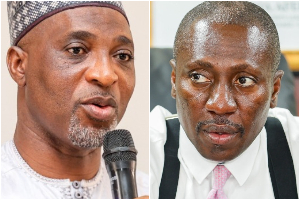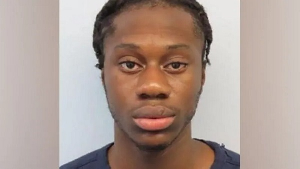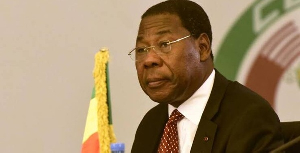I have observed, with much chagrin, the polling process which has characterized this year’s elections. The results of many of the polls released, so far, have reflected more the inordinate political biases of the pollsters than a rigorous [intellectual] process that will give voters some idea about the trend of political views/events leading to such an important election. Thus, my disappointment is two-fold: (1) such practices expose our lack of a coherent body of independent, objective pollsters that will conduct these polls—a function of the political process in many societies—(2) as well as our fervid political biases which have beclouded our rigor for research.
Within a space of about four months, there have been more than four polls each of which has given us a completely different picture of who is likely to win the December elections—even though the NPP and the NDC have been the frontrunners in all these polls. A survey conducted in April—and released in August—by the National Commission for Civic Education (NCCE) predicted a slim first-round victory for the opposition National Democratic Congress (NDC) in the December elections. The poll, which did not explain much about its research methodology, except more about the sampling size, gave the NDC 42.9% as against the NPP’s 42.6%. Soon after this poll was released—I believe two days after that—the Danquah Institute also released its poll that indicated that the NPP was leading by a very wide margin. The NDC was reported to have been favored by 25% of Ghanaians as against the NPP’s 52%.
More recently, though, the Danquah Institute conducted a survey of likely voters in which 56% of respondents were said to have favored Nana Akufo-Addo with 33% preferring Prof. John Mills of the NDC. The Policy & Strategy Associates Inc., a group that claims to be not only independent, but a “not-for-profit entity that brings together like-minded young Ghanaian working professionals based outside the country” also conducted a survey in all the ten regions of Ghana and found that were the elections held a month to election day (December 7), the NDC’s Prof. Mills would beat the NPP’s Akufo-Addo by an eleven-point margin; as of the time the survey was conducted, the NDC led with 53.6% to Akufo-Addo 42.0%. Of course, it is worth mentioning that the latest poll by Research International (R.I.), also an independent body, gave the NPP’s Akufo-Addo 48% and the NDC’s Atta Mills 38%. I am sure a different poll will throw this process into a more chaotic situation.
Even though I have been very surprised at the disparity in the results of the various polls, judging that each poll sings its own song, what strikes me most is the undercurrent political activity that has characterized this polling process, which activity not only undermines the credibility of the polls, but points to the fact that some of these pollsters want to make unnecessary political capital out of a fraudulent intellectual activity. It’s as if each of these pollsters wants to outdo the other by either discrediting other polls or by painting a positive picture about their preferred party or candidates. It strikes me as a little odd—and very laughable—why the Danquah Institute, for instance, would release a poll two days after the one released by the NCCE, attempting to undo the “damage” done by the NCCE poll. Even more crucially, I am surprised that the Policy & Strategy Associates Inc. a group that claims to be made up of academics cannot even seem to display the very simple basics of academic research, but rather can engage in a political activity that seems to have affected its credibility.
A process that should be purely objective is being fraught with political sentiments just for the sole purpose of giving some parties and candidates a false sense of hope. Over the past week, the Danquah Institute spearheaded by its Executive Director, Gabby Asare Otchere-Darko and the Policy & Strategy Associates Inc.’s Prince Kassim have been trading feature articles attempting to either question the rigor and validity of each other’s polls, or trying very hard to explain the validity or legitimacy of their polls. Gabby Otchere-Darko has particularly described the poll released by Mr. Kassim’s organization—giving the edge to the NDC—as “bogus and inaccurate” while Mr. Kassim has maintained that Mr. Otchere-Darko’s assault on the Policy & Strategy Associates Inc. is “not only an attack on democracy but also smacks of gross intolerance for serious research and academic debate.” These exchanges are funny, to say the least, and I can’t help but say that the political tug-of-war between these organizations is needless, because these pollsters cannot preside over their own cases. Why would/should pollsters who claim to be engaged in some independent, objective process be fighting so hard to fault each other’s work, when it is the duty of Ghanaians, the consumers, to do that? If it is not for political reasons, what else can these two be doing? Is that some attempt to insult Ghanaians who consume these polls released by the organizations? Shouldn’t it be the work of Ghanaians to read between the lines and decide for themselves what these polls mean? I think these people are trying too hard.
Mr. Otchere-Darko makes some very excellent points—many of which I share—in his dismissal of the polls released by the Policy & Strategy Associates Inc. Let me state a few of those. First, (he say that) the Policy & Strategy Associates Inc. does not seem to exist. I agree! Unless, of course, the organization does not value the merits of a Web site, there is no where the name comes up when one does a thorough search on the net. More so, my own research has shown that there is no such organization as Policy & Strategy Associates Inc. in the United Kingdom or the United States. Second, Mr. Otchere-Darko is definitely right that the “poll report does not reveal which constituencies were visited and the number of constituencies visited.” Third, Mr. Otchere-Darko’s assertion about the basis for Mr. Kassim’s organization’s sample size is right, and, more importantly, crucial in research. Policy & Strategy Associates Inc. mentions that “sample sizes in each region ranged from 720-765,” but that is as far as it goes. Fourth, I think the Policy & Strategy Associates, Inc. forgot that a president is chosen through popular votes and not through the Electoral College system.
Interestingly, though, even though Mr. Otchere-Darko’s Danquah Institute, in its latest poll which gave Akufo-Addo a 23-point edge over Prof. Mills employs some rigor, it leaves so much room for questioning and doubt about the process. In that poll, the Danquah Institute gives many good variables—age bracket of respondents, sample size, constituencies visited—but leaves out or fails to explain in much detail, two crucial variables: the basis for the sample size and the political affiliation of those sampled. Leaving out these two can unduly skew the results toward one political party, which will invariably affect the credibility of the polls.
The political affiliation of respondents in a survey is important. It gives some good basis for the sampling size and also explains which people traditionally identify with one party, but may have switched allegiance—just for the purpose of the impending elections—due to a number of economic, social, or political factors. The problem, however, is that because of victimization or some other reason, many people do not disclose their party affiliation (in our part of the world) even though they are likely to vote for those parties. Thus, many people who do not want to be openly associated with either the NPP or the NDC—for whatever reasons—have temporarily found, in the CPP, a haven. Thus, someone could tell you s/he belongs to the CPP, but may, in fact, vote for the NDC or the NPP.
Therefore, what is described as the Bradley Effect in the U.S. may manifest itself in a different way in our political situation. A pollster may go to a constituency or region and talk to pro-NPP or NDC people who might declare allegiance towards the CPP for instance. More so, it is likely that a pollster could go to an area and talk to a significantly skewed NDC or NPP population and conclude that that region will either go to the NDC or the NPP. Of course, some good knowledge about the demographic distribution is important, but that will not be enough to prevent a simplistic, flawed, and fraudulent polling process.
Personally, I have not been too enthused about many of the polls released so far. They lack rigor, they are political, and they are too simplistic. But, we can also ask and debate the question of whether a group that identifies itself with a political party can conduct credible polls. It’s just like asking if Fox News Channel in the U.S.A can ever conduct a poll that will give the edge to Barak Obama (even when it’s clearly so) or whether someone who is not African-American can teach African-American Literature. I would rather the polls were done by a genuinely independent body, but the likes of Policy & Strategy Associates Inc. and the Danquah Institute can conduct polls, even though they should not be believed if they throw all proper research methods to the wind.
Given what I know about Policy & Strategy Associates Inc. and the Danquah Institute, I will interpret their polls with some huge skepticism. My question, however, is: can’t we have polls in Ghana that we can believe?
Godwin J. Y. Agboka. Email[presidoo@gmail.com]














